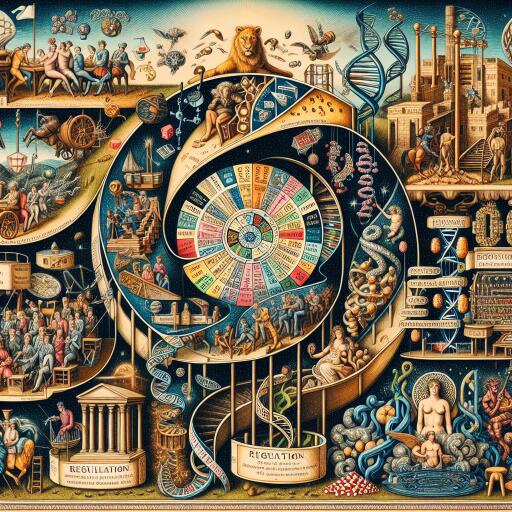“Wagering Origins, Risk, Regulation – Enbiosis”
When you think of casinos today, images of glitzy establishments, neon lights, and the lure of the jackpot come to mind. However, the journey to this modern spectacle is rich with history, risk, regulation, and evolution.
It all started in places far removed from the reputation of today’s glamorous Las Vegas. The concept of gambling is as old as civilization itself, with dice found in Mesopotamia dating back to 3,000 BC. However, it wasn’t until centuries later that organized gambling spaces, or what we now call casinos, began to emerge.
The word “casino” originates from the Italian term “casa,” which means house. During the 15th century, “casino” was used to describe small structures built for pleasure and enjoyment, including dancing, music, and gambling.
Europe’s influence on casino development can be seen most prominently with the establishment of the Casino di Venezia in Venice. Opened in 1638, this historic venue is recognized as one of the oldest existing casinos in the world, setting a trend for regulated gambling spaces.
The rise of Las Vegas as the gambling capital is a more recent phenomenon. Before Las Vegas, gambling primarily took place in saloons and backroom settings, which were often unregulated and disreputable. Everything changed in 1931 when Nevada legalized gambling, setting the stage for Las Vegas’s transformation into a gambling haven.
Initially, Las Vegas catered to a rugged crowd until the likes of Bugsy Siegel brought a new level of glamour to the scene. His introduction of The Flamingo in the late 1940s ushered in the age of luxurious casinos that combined gambling with hotel accommodations, entertainment, and dining.
However, this transformation wasn’t linear or without its challenges. Government regulations, cultural beliefs, and economic factors played significant roles in shaping the landscape of gambling. Throughout the 20th century, new laws and regulations arose that sought to curb illegal gambling activities, while also recognizing the potential economic benefits of a regulated gambling industry.
As technology evolved, so did the casino industry. The development of Random Number Generators (RNG) revolutionized the modern casino by ensuring fair play in gaming, both in physical settings and online platforms. Speaking of online platforms, online casinos emerged in the mid-1990s, offering players the chance to gamble from the comfort of their own homes.
Today’s casino industry is not only about luck and risk; it is a high-tech, globally interconnected phenomenon. With the rise of artificial intelligence, casinos are using data-driven insights to optimize player experiences and improve security measures. AI helps prevent fraud and personalize gaming experiences, providing tailored promotions and games to individual players.
Virtual Reality (VR) and Augmented Reality (AR) are also pushing the boundaries of traditional casino experiences. VR casinos replicate the experience of being on a casino floor from whatever location the player chooses, creating an immersive environment complete with NPCs (non-playable characters) operated by sophisticated AI.
Despite technological advances, casinos remain deeply rooted in their historic origins. Games such as blackjack, originally played with painted wooden blocks, have evolved dramatically over the centuries. This game, along with others like poker and baccarat, illustrates how risk and chance have been universal themes throughout human history.
Modern-day casinos offer a multi-billion-dollar experience where entertainment, risk, and regulation intersect at the global forefront. The enduring appeal of casinos lies in their ability to adapt and evolve while keeping the fundamental thrill of taking a gamble.
From small Italian houses to vast empires of entertainment, casinos have written a narrative filled with drama, innovation, and evolution over the centuries. As they continue to advance technologically, they are poised for a highly promising future. The rich history of the casino industry is a testament to its ability to reinvent itself while remaining an integral part of the human penchant for gaming and spectacle.









